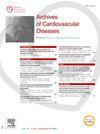Genetic predisposition to anxiety and its association with myocardial infarction risk: A two-sample Mendelian randomization study
IF 2.2
3区 医学
Q2 CARDIAC & CARDIOVASCULAR SYSTEMS
引用次数: 0
Abstract
Psychological problems, including anxiety and depression, are becoming increasingly prevalent worldwide, and are strongly correlated with coronary artery disease, specifically myocardial infarction. Whereas genetic studies have linked depression to myocardial infarction, research exploring the genetic relationship between anxiety and myocardial infarction is lacking. The causal relationship between these conditions also remains uncertain. To determine whether a genetic predisposition to anxiety contributes causally to myocardial infarction. We used summary statistics from large-scale genome-wide association studies of anxiety and myocardial infarction to test the genetic correlation between the two datasets using Mendelian randomization analyses. Anxiety was found to increase the risk of myocardial infarction: Mendelian randomization-Egger odds ratio 28.638, 95% confidence interval 2.874–285.383 (=0.007); inverse variance weighted odds ratio 1.501, 95% confidence interval 1.046–2.153 (=0.027); weighted median odds ratio 1.757, 95% confidence interval 1.050–2.942 (=0.032). However, some directional pleiotropic effects of anxiety on myocardial infarction were observed. Analysis through R packages and Mendelian randomization-Egger methods supported a causal effect of anxiety on myocardial infarction. Mendelian randomization-robust adjusted profile score results also supported this conclusion. Our study provides evidence that a genetic predisposition to anxiety may play a causal role in the development of myocardial infarction. Early prevention and diagnosis of anxiety are crucial in managing myocardial infarction.焦虑的遗传倾向及其与心肌梗死风险的关系:双样本孟德尔随机研究
包括焦虑和抑郁在内的心理问题在全球范围内越来越普遍,并且与冠状动脉疾病,特别是心肌梗塞密切相关。遗传学研究已将抑郁症与心肌梗塞联系在一起,但还缺乏探索焦虑与心肌梗塞之间遗传关系的研究。这些疾病之间的因果关系也仍不确定。为了确定焦虑的遗传倾向是否与心肌梗塞有因果关系。我们利用大规模焦虑和心肌梗死全基因组关联研究的汇总统计,采用孟德尔随机分析法检验了两个数据集之间的遗传相关性。结果发现,焦虑会增加心肌梗塞的风险:孟德尔随机化-艾格比值为 28.638,95% 置信区间为 2.874-285.383 (=0.007);逆方差加权比值为 1.501,95% 置信区间为 1.046-2.153 (=0.027);加权中位比值为 1.757,95% 置信区间为 1.050-2.942 (=0.032)。不过,也观察到焦虑对心肌梗死的一些定向多效应。通过 R 软件包和孟德尔随机化-Egger 方法进行的分析支持焦虑对心肌梗死的因果效应。孟德尔随机化调整后的特征得分结果也支持这一结论。我们的研究提供了证据,表明焦虑的遗传易感性可能在心肌梗死的发生中起着因果作用。早期预防和诊断焦虑症对于心肌梗死的治疗至关重要。
本文章由计算机程序翻译,如有差异,请以英文原文为准。
求助全文
约1分钟内获得全文
求助全文
来源期刊

Archives of Cardiovascular Diseases
医学-心血管系统
CiteScore
4.40
自引率
6.70%
发文量
87
审稿时长
34 days
期刊介绍:
The Journal publishes original peer-reviewed clinical and research articles, epidemiological studies, new methodological clinical approaches, review articles and editorials. Topics covered include coronary artery and valve diseases, interventional and pediatric cardiology, cardiovascular surgery, cardiomyopathy and heart failure, arrhythmias and stimulation, cardiovascular imaging, vascular medicine and hypertension, epidemiology and risk factors, and large multicenter studies. Archives of Cardiovascular Diseases also publishes abstracts of papers presented at the annual sessions of the Journées Européennes de la Société Française de Cardiologie and the guidelines edited by the French Society of Cardiology.
 求助内容:
求助内容: 应助结果提醒方式:
应助结果提醒方式:


